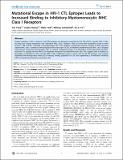Mutational Escape in HIV-1 CTL Epitopes Leads to Increased Binding to Inhibitory Myelomonocytic MHC Class I Receptors
Author(s)
Yang, Yue; Huang, Jinghe; Toth, Ildiko; Lichterfeld, Mathias; Yu, Xu G.
DownloadYang-2010-Mutational Escape in HIV-1 CTL Epitopes Leads to Increased Binding to Inhibitory Myelomonocytic MHC Class I Receptors.pdf (225.7Kb)
PUBLISHER_CC
Publisher with Creative Commons License
Creative Commons Attribution
Terms of use
Metadata
Show full item recordAbstract
Escape mutations in HIV-1 cytotoxic T cell (CTL) epitopes can abrogate recognition by the TCR of HIV-1-specific CD8+ T cells, but may also change interactions with alternative MHC class I receptors. Here, we show that mutational escape in three HLA-A11-, B8- and B7- restricted immunodominant HIV-1 CTL epitopes consistently enhances binding of the respective peptide/MHC class I complex to Immunoglobulin-like transcript 4 (ILT4), an inhibitory myelomonocytic MHC class I receptor expressed on monocytes and dendritic cells. In contrast, mutational escape in an alternative immunodominant HLA-B57-restricted CTL epitope did not affect ILT4-mediated recognition by myelomonocytic cells. This suggests that in addition to abrogating recognition by HIV-1-specific CD8 T cells, mutational escape in some, but not all CTL epitopes may mediate important immunoregulatory effects by increasing binding properties to ILT4, and augmenting ILT4-mediated inhibitory effects of professional antigen-presenting cells.
Date issued
2010-12Journal
PLoS ONE
Publisher
Public Library of Science
Citation
Yang, Yue, Huang J, Toth I, Lichterfeld M, Yu XG (2010) Mutational Escape in HIV-1 CTL Epitopes Leads to Increased Binding to Inhibitory Myelomonocytic MHC Class I Receptors. PLoS ONE 5(12): e15084. © 2010 Yang et al.
Version: Final published version
ISSN
1932-6203